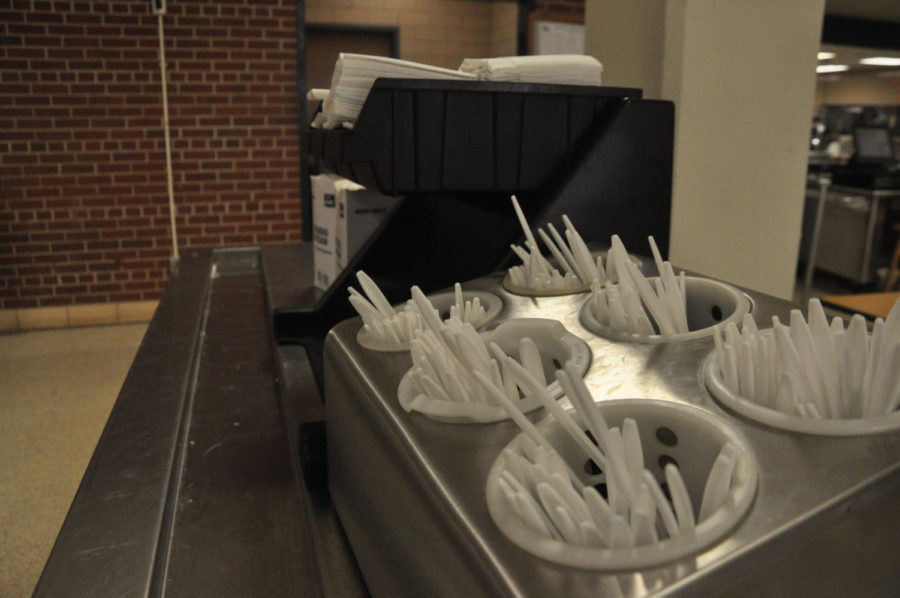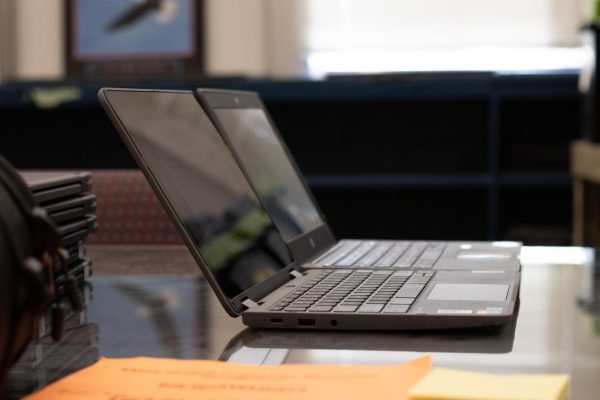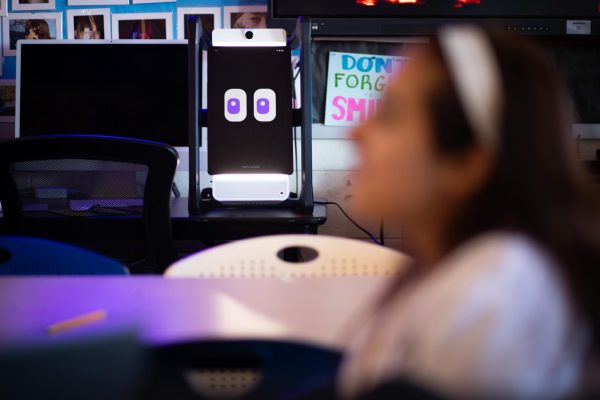BYOB: Bring Your Own Bag
Bans on single-use plastic are becoming more prominent in America
Photo by Hart Walker
Plastic utensils in East Meck cafeteria.
Within the United States, there are many big cities that are taking a stand against the widespread use of single-use plastic. Among these cities are Washington, D.C., San Diego, Calif. and Seattle, Wash.
If one has ever visited the nation’s capital and shopped, they will have noticed that there is a fee of 5 cents charged for each carryout paper or plastic bag. This disposable bag fee has been enforced following the enactment of the Anacostia River Clean Up and Protection Act of 2009. Most recently, on Jan. 1, 2019, a ban on plastic straws in restaurants and other businesses was enacted in the District of Columbia.
While banning plastic straws and single-use plastic bags is a start, plastic bottles also make great contributions to the sea of plastic among Earth. Each day in the U.S., more than 60 million plastic (polythene) water bottles are thrown away. Most end up in landfills or incinerators, while millions will land in America’s streets, parks and waterways.
Despite the availability of biodegradable bottles, polythene water bottles are still accepted. Since the fall of 2017, biodegradable bottles have been successfully produced by scientists. Scientists from the Centre of Sustainable Chemical Technologies (CSCT) at the University of Bath have successfully created a plastic that doesn’t use harmful chemicals and is biodegradable. The bottle is made of sugar and carbon dioxide.
According to National Geographic, less than a fifth of all plastic gets recycled globally and less than 10 percent in the U.S. Scientists also discovered that about 6.3 billion tons never made it to a recycling bin in 2017.
Right now, it is unclear how long it takes for plastic to completely biodegrade into its constituent molecules. Experts estimate it to range from 450 years to never. Meanwhile, ocean plastic is estimated to kill millions of marine animals annually. Plastic pollution in oceans is known to have affected almost 700 species of animals, including endangered ones. It is not uncommon for animals to be strangled by abandoned fishing nets or discarded six-pack rings.
Because of the great impact on the environment, many corporations are banning some plastic utensils. Among them are Starbucks, McDonald’s at its United Kingdom and Ireland restaurants, Red Lobster, Bon Appétit Management, the Walt Disney Company and Alaska Airlines.
Another trailblazer in environmental policy has been the City of Seattle. In July 2018, Seattle became the largest U.S. city to ban plastic straws. Spoons, forks, styrofoam containers and knives were also banned. Seattle now requires that all food service businesses find recyclable or compostable packaging alternatives to all disposable food service items such as containers and straws. This ban applies to all food service businesses, including but not limited to grocery stores and institutional cafeterias. The exceptions to Seattle’s new policy include but are not limited to metal foil and disposable flexible plastic drinking straws when needed by customers due to medical or physical conditions and for whom flexible compostable paper straws are unsuitable (such as a broken jaw).
Other places on the western coast of the U.S. have made progress in single use plastic policies such as San Diego, Calif. On Jan. 8, 2019, San Diego became one of the most notable cities to ban containers made of foamed polystyrene, most commonly known as Styrofoam. The ban includes food and drink containers, egg cartons, ice chest coolers and aquatic toys for swimming pools. Styrofoam is popular because it is cheap, strong and has great insulation. Unfortunately, it’s also extremely difficult to clean up and is rejected by recycling centers because it breaks into small pieces. The permanent ban was approved by the San Diego City Council in a 6-3 vote. There was opposition from small restaurant owners regarding the cost of using environmentally degradable containers, such as cardboard or compostable paper.
Outside of plastic bans, the Save our Seas Act was passed with bipartisan support in mid-2018. This law amends the National Oceanic and Atmospheric Administration’s Marine Debris Act and funds the program through 2022. The goal of the law is to clean up plastic trash from the world’s oceans.
Environmental issues are becoming increasingly partisan in American politics. Climate policy specifically as well as like limiting carbon emissions. Republican lawmakers in Calif. opposed the ban on plastic straws because it would burden small businesses and do little to fight the larger plastic pollution crisis. According to Bloomberg news, plastic straws make up less than one percent of total plastic waste by mass that is found in the oceans.
Places outside the United States are also introducing environmentalist policies. On July 6, 2018, Chile’s Constitutional Court ratified a bill that bans the retail use of plastic bags nationally. Chile is concerned about plastic pollution in the ocean and on land. Chile’s ban is the first country-wide one in the Americas. Similar bans have been passed in China, Kenya, France, and elsewhere. Large retailers will have six months to phase out single-use plastic bags, while small businesses will have up to two years. The ban builds on a law passed under the previous president that had called for a prohibition on plastic bags along the country’s 4,000-mile coastline.
In late Oct. 2018, the European Parliament voted 571-53 to approve a measure to ban single-use plastic across Europe. The European Union (EU) wants to begin enforcing the ban as early as 2021 but it still needs to pass additional procedural measures before it can go into effect. This ban would be towards plastic cutlery and plates, cotton swabs, straws, drink-stirrers and other types of single-use plastics like food containers. The EU recognizes that there are not widely available alternatives for some things, so they are just banning things that have comparable alternatives.
Another stride that has been taken to combat environmental issues is the United Nations Paris Climate Agreement. The U.N. Paris Climate Agreement is an agreement of almost 200 countries. The agreement deals with reducing greenhouse gas emissions starting in the year 2020.
What can you do?
There are many ways that one can lessen their environmental footprint. To start, begin by not using plastic straws and other utensils and using canvas/reusable bags when shopping.
Your donation will support the student journalists of East Mecklenburg High School. Your contribution will allow us to purchase equipment and cover our annual website hosting costs.








